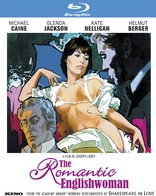The Romantic Englishwoman Blu-ray Movie
HomeThe Romantic Englishwoman Blu-ray Movie 
Kino Lorber | 1975 | 116 min | Rated R | Jun 21, 2011Movie rating
6.7 | / 10 |
Blu-ray rating
| Users | 0.0 | |
| Reviewer | 3.5 | |
| Overall | 3.5 |
Overview
The Romantic Englishwoman (1975)
Comedy-drama about a successful novelist who invites a handsome young man to his home to provide input to his screenplay. His wife completes the romantic triangle.
Starring: Glenda Jackson, Michael Caine, Helmut Berger, Michael Lonsdale, Kate NelliganDirector: Joseph Losey
| Drama | Uncertain |
| Comedy | Uncertain |
Specifications
Video
Video codec: MPEG-4 AVC
Video resolution: 1080p
Aspect ratio: 1.65:1
Original aspect ratio: 1.85:1
Audio
English: LPCM 2.0
Subtitles
None
Discs
50GB Blu-ray Disc
Single disc (1 BD)
Playback
Region A (B, C untested)
Review
Rating summary
| Movie | 4.0 | |
| Video | 4.0 | |
| Audio | 4.0 | |
| Extras | 0.5 | |
| Overall | 3.5 |
The Romantic Englishwoman Blu-ray Movie Review
I’d like a show of hands: How many people are buying this disc for the cover art?
Reviewed by Casey Broadwater June 22, 2011Fiction becomes real in The Romantic Englishwoman, a cleverly self-referential 1975 British film from director Joseph Losey, an American who moved to London after being blacklisted in Hollywood for his supposed communist sympathies. Losey is best known for his collaborations with playwright Harold Pinter, who wrote the screenplays for 1963’s The Servant, 1967’s Accident, and 1971’s The Go-Between, three films that—amongst other things—explore gender roles, sexual psychology, and infidelity. Working off a screenplay by Thomas Wiseman and Tom Stoppard—the latter of whom would go on to co-write Shakespeare in Love—Losey returns to the subject of sex for The Romantic Englishwoman, examining upper-class boredom, the “New Woman” of the 1970s, and the dangers of letting fantasy influence reality. Like a more accessible version of Alain Resnais’ Last Year at Marienbad, which had to have had some influence on the script, the story revolves around a “did they, or didn’t they” mystery of sexual tension and malaise. It’s also darkly funny, a fact that goes overlooked in much discussion of the film.
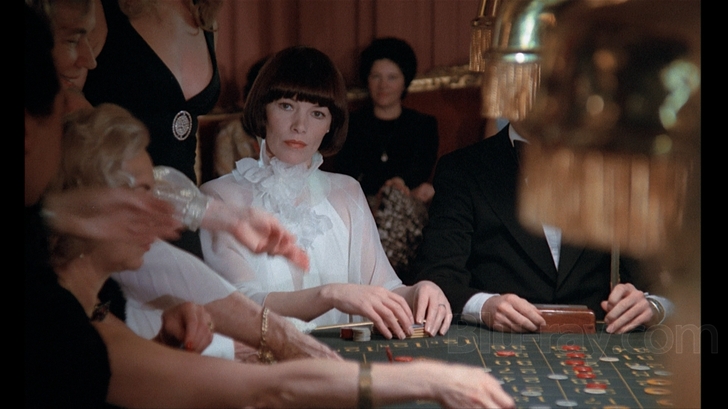
The Romantic Englishwoman
The story opens on a train heading through a snowy pass to the German spa town of Baden-Baden, where Europe’s fusty upper crust has congregated since the 19th century. Bored, wealthy housewife Elizabeth Fielding (Glenda Jackson) is heading off for a weekend holiday to “find herself,” leaving behind in England her young son and her husband, Lewis (Michael Caine), a successful paperback writer. Also on the train is Thomas (Helmut Berger), a roguish German smuggler and gigolo—posing as a poet—whom we see retrieving a hidden package of drugs from the lavatory. At the opulent hotel where both are staying, Elizabeth and Thomas casually catch one another’s eyes across a gambling table, and when they meet by chance in an elevator, you can practically see the sexual electromagnetic field that attracts them.
Back home, Lewis suspects something, just from the tone in Elizabeth’s voice over the telephone. A movie producer has recently tried to sell him on the idea of writing a screenplay, a “psychological story about the New Woman,” and although Lewis calls this idea boring—in a bit of foreshadowing, he suggests turning it into a thriller—it sticks in his subconscious, and he begins to have fantasies of Elizabeth being seduced in an elevator by a shadowy stranger. When Elizabeth returns to England, she has her suspicions too; the first thing she does when she gets home is to check their bed for evidence that Lewis might be bonking the sexy French au pair, Catherine (Béatrice Romand). The couple’s collective sexual frustration is palpable; whenever they begin to make love, they’re always interrupted mid-coitus, once by a nosy neighbor—while they’re doing it out in the garden—and again by their crying child. Both parties are tensely pent-up.
The tension increases exponentially when Lewis gets a letter from Thomas, who claims to be fan of his, mentions meeting Elizabeth, and declares his intentions to drop by for a visit next time he’s in England. When the Teutonic poseur arrives he’s abrupt and rude, and he tips his hand when he mistakes Lewis for the other Fielding, the one who wrote Tom Jones. Thomas is clearly a social parasite, and though Lewis recognizes that the fake poet plans to mooch off him for the summer, he allows him to stay and even offers him a small stipend to be his typist. Lewis’ motivations are two-fold: He wants to see if he can catch Elizabeth in a lie about what may or may not have happened in Baden-Baden, and he’s also after inspiration for his screenplay, a thriller about discontent which is beginning to incorporate a few too many autobiographical elements.
Soon, reality and fiction blur, with Lewis’ fantasies beginning to influence and orchestrate actual events. Losey and his screenwriters take this a step further, at times obfuscating whether what we see on screen is real, a product of Lewis’ imagination, or both. The film’s final act seems to devolve into melodramatic thriller conventions—with mysterious gangsters, missing drugs, and romantic seaside locales—but there’s an intentionality to the plot’s descent into cliché. You see an extraordinarily similar device in the Spike Jonze/Charlie Kaufman meta-movie, Adaptation. The filmmakers are commenting as much on their own storytelling trade as they are on the nature of sexual jealousy.
Losey handles the tricky self-referential material with subtlety and restraint, inconspicuously filling the film with reflections and self-portraits, from the opening shot of Elizabeth mirrored in the glass train window to the screen-printed images of her face that cover the walls of Lewis’ writing room. Form and content coalesce when we realize the film’s central theme—that sexual attraction is illusory, born as much out of hyped up imagination and boredom as it is rooted in biological reality. “People make too much out of sex,” says Thomas, “it shouldn’t be anything you leave home for.”
Fortunately, the film’s philosophical bent is backed up by a love triangle story that’s interesting enough even on its surface layer. The way that Lewis seems to push his wife willfully toward infidelity is a strange but believably executed turn—perhaps he has a repressed cuckoldry fetish—and the strained relations between the three main characters turns the Fieldings’ plush suburban estate into an emotional powder-keg. Glenda Jackson is wonderful as the ennui-afflicted wife, testing her own personal boundaries, and Helmut Berger—who was Italian director Luchino Visconti’s lover for a time—is believable as a gigolo, a charmer with the capacity to make women believe his every word. Of course, Michael Caine is always worth watching, but he was at the top of his game in the 1970s, and when he bursts into rage here you’ll feel like ducking for cover. Speaking of cover, that barely-there, ripped-to-shreds outfit Jackson wears in the poster art? It never shows up in the film. Bummer.
The Romantic Englishwoman Blu-ray Movie, Video Quality 
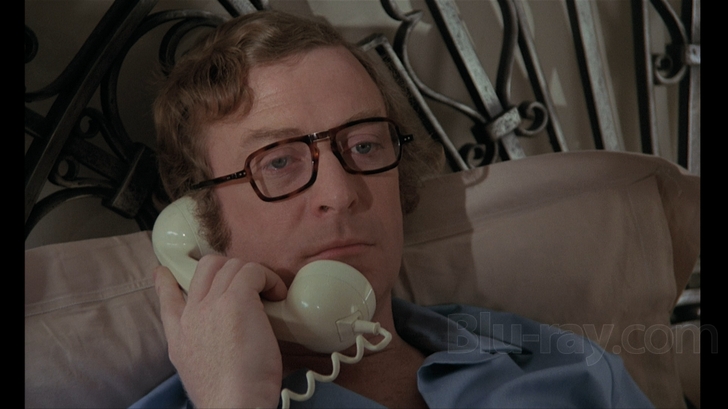
Kino-Lorber brings The Romantic Englishwoman to Blu-ray with a faithful 1080p/AVC-encoded transfer that's a pleasure to watch. As is usual for the distributor, Kino's approach is decidedly hands-off. There's been no attempt to boost the image artificially, scrub out grain with DNR, or artificially sharpen the picture—the film looks entirely natural. The starting point for this transfer is a very clean print; you'll notice a few scattered flecks, small scratches, and minor fluctuations, but no major debris or damage. Though obviously softer than most contemporary releases, the nearly 1.66:1-framed image —I believe this is original exhibition ratio— yields an excellent level of clarity, revealing detail in the fine textures of the actors' faces and even, in close- ups, in the fabric of Michael Caine's tweedy suit jackets and turtleneck sweaters. (Seriously, I think it was a requirement in the film that every character wear a turtleneck at least once.) Color is also somewhat muted by today's standards, but looks wonderful—realistic and sufficiently dense. Black levels and contrast are consistent as well, and don't appear to have been tampered with here. I didn't spot any excessive noisiness or any other compression problems either. As I see it, the only possible improvement that could be made would be to digitally clean up the print, but the small specks you do see are insignificant and far from distracting.
The Romantic Englishwoman Blu-ray Movie, Audio Quality 
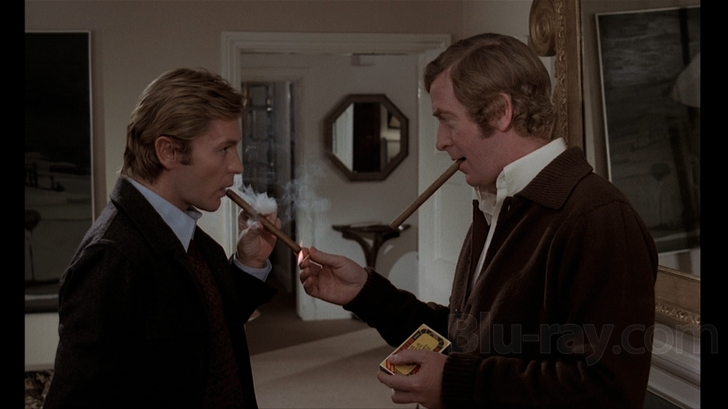
For audio, we get the film original stereo output by way of a Linear PCM 2.0 track. There's not much to say here; this is a functional mix that does what it needs to do with little flourish. There are a few moments when the dialogue seems somewhat low or gets broken up by some slight crackling, but this isn't a common occurrence at all. For the most part, this is a clear, concise track, with voices that are easy to understand—which is good, because there are no subtitle options on the disc whatsoever—and a score that's rich and expressive. There's not much breadth in the music's dynamics—everything is confined to the mid range—but it sounds wonderful nonetheless. Most importantly, there are no harsh hisses, sudden drop-outs, or other inexcusable issues.
The Romantic Englishwoman Blu-ray Movie, Special Features and Extras 
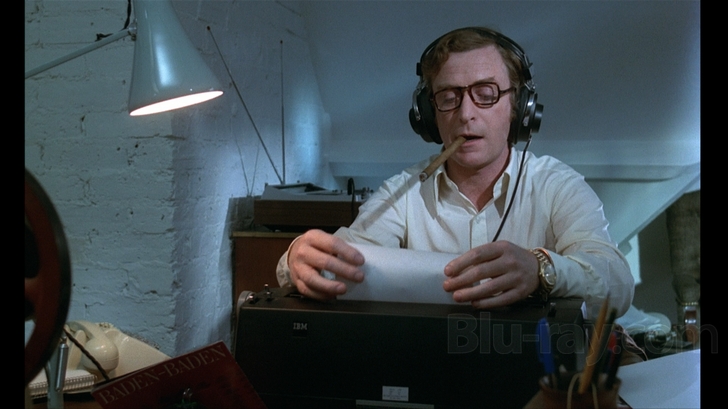
- Stills Gallery: A user-directed gallery with eight stills.
- Also From Kino-Lorber: Includes trailers for The Maids (3:09), Galileo (3:33), Priest of Love (2:45), and Lady Chatterley (2:09) in standard definition.
The Romantic Englishwoman Blu-ray Movie, Overall Score and Recommendation 
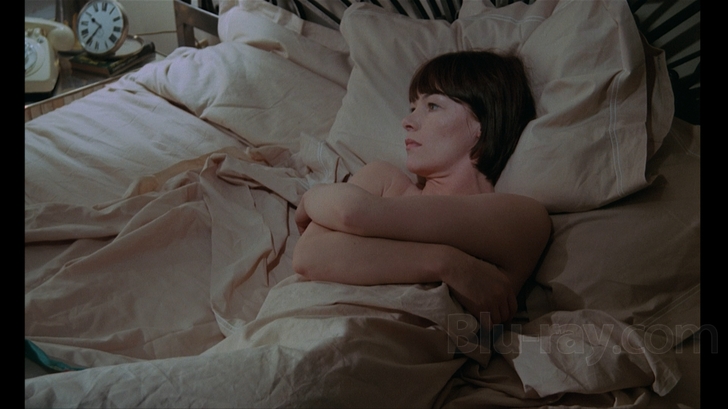
The Romantic Englishwoman is an enigmatic film, part love affair melodrama and part self-conscious meta-movie. It wasn't as well received as some of Losey's earlier films—The Servant won several British Academy Awards, for instance, and The Go-Between took the Golden Palm prize at Cannes—but it's certainly worth revisiting, as it serves as a kind of summary of the director's favorite themes. And really, you can't go wrong with Michael Caine in the '70s. Kino-Lorber's release looks and sounds great—this is the first time the film has appeared on disc in the U.S.—so I see no reason for the curious not to pick The Romantic Englishwoman up. Recommended.
Similar titles
Similar titles you might also like

Crimes and Misdemeanors
1989

Damage
1992

The Image Book
Le livre d'image
2018

Like Someone in Love
ライク・サムワン・イン・ラブ / Raiku samuwan in rabu
2012

Love in the Afternoon
L'amour l'après-midi / Chloe in the Afternoon
1972

Thirst
Törst
1949

Coup de Chance
Wasp 22
2023

Transit
2018

Mister Lonely
2007

Bob & Carol & Ted & Alice
Limited Edition to 3000
1969

Human Nature
2001

A Married Woman
Une femme mariée: Suite de fragments d'un film tourné en 1964
1964

The Painted Bird
Nabarvené ptáce / Slipcover in Original Pressing
2019

La Bête Humaine
1938

Cairo Station
باب الحديد
1958

Tangerine
2015

Le Plaisir
1952

Let's Go Up the Champs-Élysées
Remontons les Champs-Élysées
1938

A Man Called Ove
En man som heter Ove
2015

I Vitelloni
1953
